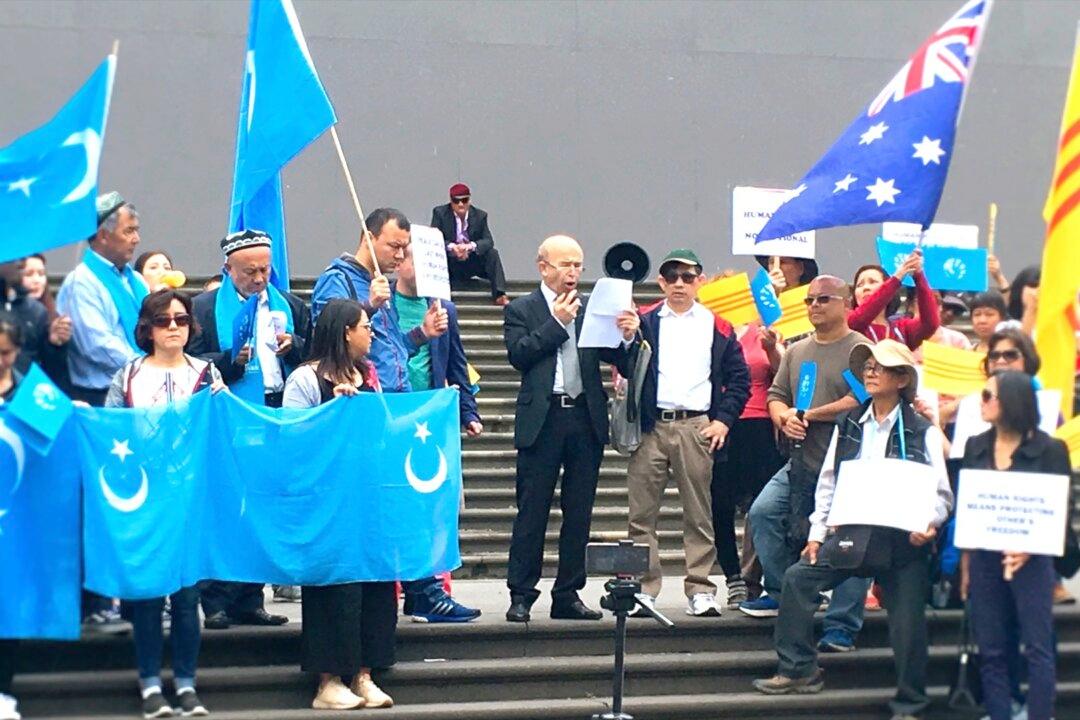At least 10 Australian residents may be among the hundreds of thousands of Uyghurs imprisoned in the Chinese regime’s “re-education camps” in Xinjiang province, prompting safety concerns from family members in Australia.
Nurmuhammad Majid, president of the East Turkistan Australian Association (ETAA) said that he is aware of nine Australian residents and one Australian citizen, who have not made any contact with family members since traveling to China.
“[M]ost of the visits happened at end of 2016 or 2017. Then after that period, the families did not hear from them,” Majid told The Epoch Times.
Majid said the Australian residents who are currently detained went to China solely to visit family but instead had their passports confiscated and then sent to “political study courses” in China.
“[S]ome of them have been confirmed by those living in Australia stating that they are locked up and their passports seized by authorities.
‘Re-Education Camps’ a Cover-Up for Widespread Abuse
Testimonials from former Uyghur detainees have revealed widespread human-rights abuses within these purpose-built “re-education camps,” where over one million Uyghurs are detained.Mihrigul Tursun, a 29-year-old Uyghur woman, spoke of her accounts while being detained three times.
Tursun was first detained by Chinese authorities in May 2015, when she arrived in China from Egypt with her three two-month-old triplets. Upon arrival, authorities took her children away and then interrogated her. Her passport, ID cards and cellphone were confiscated.
“Then, they handcuffed me, put a dark sack over my head, and took me to a detention center,” Tursun said.
After three months, she was “paroled” because her children were deemed “sick,” which was suspicious as her children were healthy prior to arriving in China. Unfortunately, her eldest son died the next day.
Tursun eventually arrived in the United States on Sept. 2018, through assistance from the U.S. government.
Concerns From Australian Uyghurs
Zulfiye Hiwilla, a Sydney-based Uyghur, told SBS news that her sister and brother-in-law, who are both Australian residents, have not returned since travelling to China in 2017 and she believes that they are in the “re-education camps.”“Their daughter and son are still in Australia … They have been very angry, shocked, the kids cry and [are] very stressed,” Hiwilla told SBS news.
Concerns for the safety of Uyghurs in Australia have also been raised.
Nurmuhammad Majid of the ETAA was aware of an incident where an Australian resident was called by the Chinese police via FaceTime on WeChat. The Chinese police harassed their family members in China and demanded cooperation and information from the relative in Australia.
“[W]e can confirm that Australian Uyghur families living in Australia … desperately [need] the help and the protections of the Australian government.”
Magid said there could be more than the 10 confirmed cases of Australian Uyghurs imprisoned in Xinjiang, given that other Australian Uyghurs could be isolating themselves from the community due to fear by the CCP.
Australia Responds, But Is It Enough?
A spokesperson for the Australian Department of Foreign Affairs and Trade (DFAT) said in an email that despite not being able to determine the exact number of Australians detained in Xinjiang, Australia has “urged China to cease the arbitrary detention of Uighurs.”Omer Kanat, Executive Committee Chairman of the World Uyghur Congress told The Epoch Times that Australia could do more.
“We want Australia to do more. First of all to ask China to stop ongoing repression in East Turkistan. Secondly, we want the Australia to protect it’s own citizens. Because there a lot of Uyghur Australians, Uyghurs who are the citizens of Australia.”
“Communist Party viceroy, Chen Quanguo, with his monstrous plan to incarcerate a million Uyghurs in concentration camps, will not be forgotten by legislation like this if it is passed and a future federal government has a chance to name him,” Danby said in Parliament.
Nurmuhammad Majid hopes that international pressure will bring an end to the imprisonment of Uyghurs and other groups in China but understands: “This is an alarming issue that the Chinese government will not listen to the directions of the countries—in terms of human rights or religious freedoms of the other groups, including Uyghurs, Tibet or Falun Gong practitioners in China.”
Majid added that countries such as Australia, the United States, and European countries: “should be brave enough to speak against the Chinese government and demanding the improvement of the human rights situations and also to be demanding the release of the people who are innocently detained by the Chinese authorities.”





